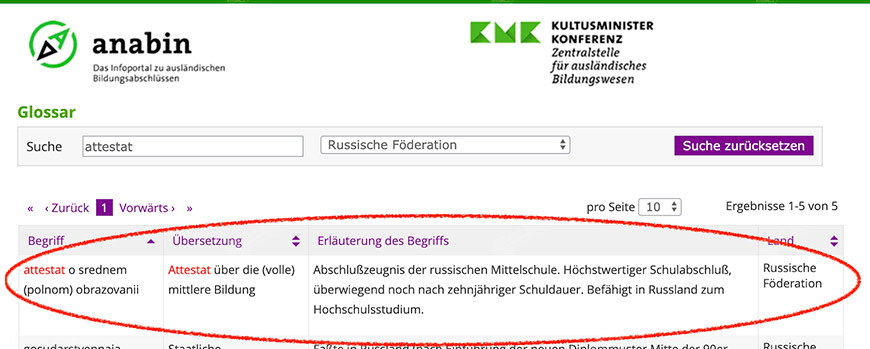
Standards, rules and recommendations for the translation of documents for study and work in Germany
Each country has its own standards to check the level of education. This is due to the differences in the assessment system and approaches to the educational structure. That is why, when applying to study or work abroad, you should have an adequate translation of documents that are required by the country of interest.
Assessment of educational level in Germany
Unlike in other countries, in Germany it is not enough just to present educational documents. Confirmation of the information of interest is obtained here through the anabin database.

With the help of this system, it is possible to clarify both the names of disciplines and curricula, and titles of universities. Just for this reason, responsible translators do not consider it superfluous to verify the data on anabin. If it happens that there is no information of interest, then the rules of the German language will be the only guide to action. A good solution would be to perform a descriptive translation.
How to translate the word “certificate” correctly
Usually you have to choose between such translation options as Zeugnis or Attestat. A qualified specialist knows that Zeugnis is a general definition of different certificates, regardless of their type. That is why the use of the word Zeugnis will not be a mistake. But the choice in favor of Attestat can be explained by the convenience of comparing the document on the anabin database. Proximity to the original sound also plays a role.
How to avoid confusion with Magister and Master
Translated into Ukrainian, the term Magister is used to denote the qualification of a specialist who has completed appropriate training lasting 4-5 years. It concerns the humanities, philosophy and theology. There may also be a double or triple specialization. However, after the connection of Germany to the Bologna process, Magister is increasingly giving way to the term Master.
Even though anabin recommends Magister, the term Master is considered the most acceptable for Ukraine. This situation is justified by the issuance of bachelor's and master's degrees in the territory of Ukraine in accordance with the standards of the Bologna process.
When translating the word “bachelor”, it is advisible to follow the recommendations of anabin and give preference to the term Bachelor, with Magister and Master everything looks different. For example, the original entry Magister (Information Systems and Technologies) in this database looks like Magister (Informationssysteme und -technologien), but Ukrainian translators choose the Master version (Informationssysteme und -technologien.

Translation of academic degrees
Given the recognition of academic degrees by a bilateral agreement between Germany and Ukraine, it is necessary to keep in mind the recommendations regarding translation. In this regard, there is a mention in the anabin system about the compliance of the term Doktorgrad with the Ukrainian “candidat”, and habilitierter Doktor with Ukrainian “doctor”.
For the convenience of verification by the German of the relevant documents on the database, the degrees are not adapted. Thus, Kandidat corresponds to a candidate, Doktor to a doctor. For example, a candidate of philosophical sciences is Kandidat der philosophischen Wissenschaften in German language.
Name transliteration standards
When transliterating names, translators have to choose which transliteration rules to use. If we talk about the ISO 9 standard recommended for the translation of Cyrillic proper names, then they are guided by the principle that one letter in Cyrillic corresponds to one letter in Latin. It is this rule that is used in Germany when it is necessary to transliterate full names or geographical names. However, this method is preferred only in the absence of an established translation in the Duden dictionary and other authoritative sources.
And the fact that the ISO 9 standard provides for the use of diacritics is explained by the difference in the alphabets of different countries. Despite the convenience and logic, the problem may be the use in Ukraine of the ICAO rules. In this regard, there is a risk of lack of uniformity in writing one package of documents.
To ensure that the client is satisfied and there are no difficulties at the German consulate, translators respond to the request to work with the ISO 9 standard. But the most correct thing is to indicate the spelling that is given in the passport in the translation. By giving preference to such an order of actions, it is possible to prevent discrepancies in one package of documentation. Therefore, even when using the ISO 9 standard to transliterate full name , the translator will necessarily indicate the translation option mentioned in the passport to travel abroad in parentheses.
Comparison table
| Cyrillic alphabet | ISO 9 standard |
| А | A |
| Б | B |
| В | V |
| Г | G |
| Д | D |
| Е | E |
| Є | Ê |
| Ж | Z̄ |
| З | Z |
| И | Y |
| І | I |
| Ї | Ì |
| Й | J̌ |
| К | K |
| Л | L |
| М | M |
| Н | N |
| О | O |
| П | P |
| Р | R |
| С | S |
| Т | T |
| У | U |
| Ф | F |
| Х | H |
| Ц | C |
| Ч | Č |
| Ш | Š |
| Щ | Ŝ |
| Ь | ʹ |
| Ю | Û |
| Я | Â |
